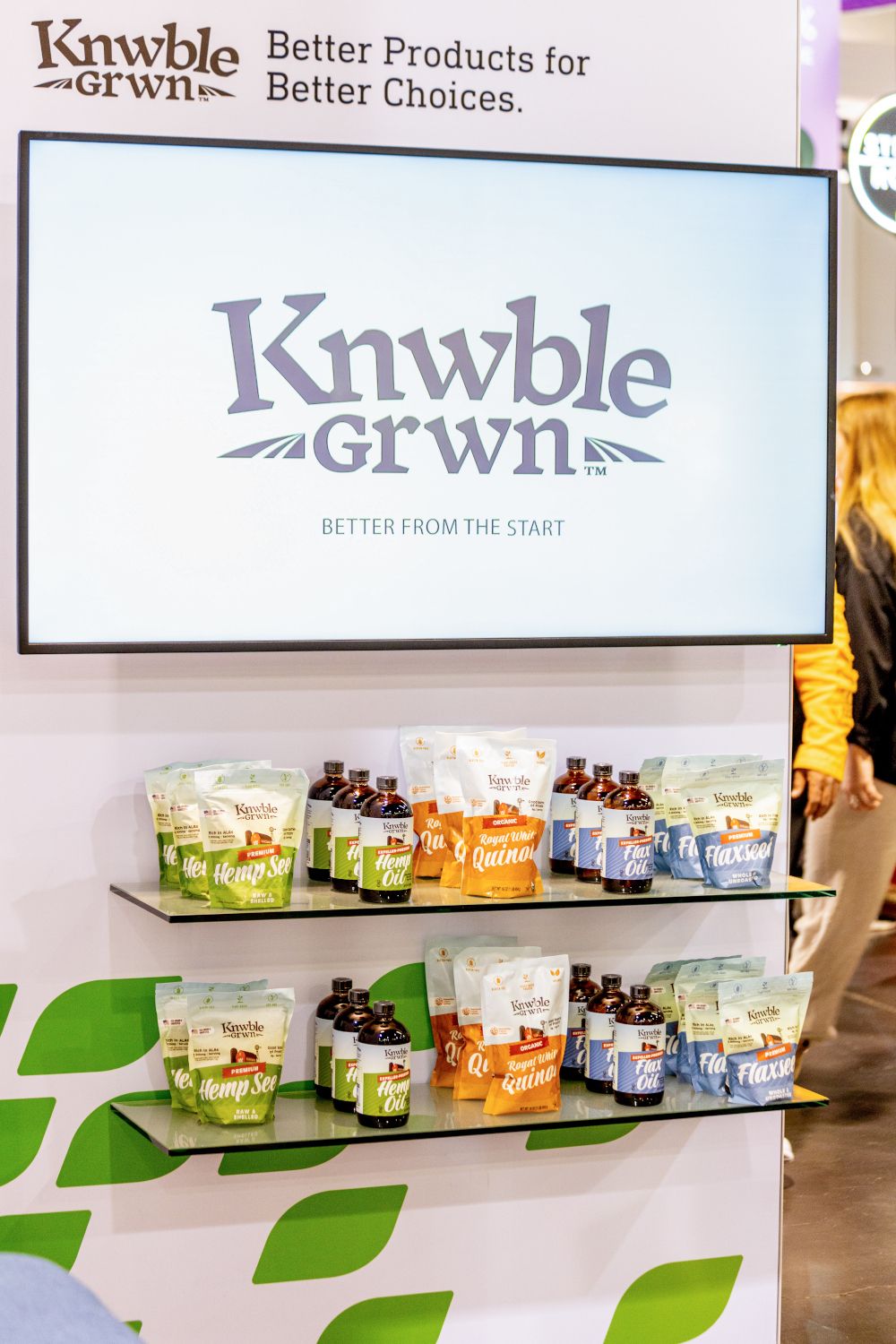ADM’s new flax retail product line is built on regenerative farming: Natural Products Expo West report
At Expo West, the company and its farmer-partner explained how they’re working together to make regenerative farming a profitable business model.
Photo from ADM

Archer Daniels Midland (ADM; Red Wing, MN) formally launched its Knwble Grwn flaxseed and flax oil retail product brand during March’s Natural Products Expo West trade show in Anaheim, CA. ADM has processed flax at its Red Wing, MN, facility since 1902, but it was only this year that the company began manufacturing for the food-grade segment. What’s striking about Knwble Grwn is that its flax is sourced exclusively from farmers who practice regenerative farming. During Expo West, Knwble Grwn and its farmer-partner explained how they are working together to grow this partnership.
When asked why ADM decided to launch Knwble Grwn, Guy Christensen, brand ambassador for Knwble Grwn, said, “Any sustainable initiative is worth going after, to begin with. Knwble Grwn is soil health–based. We start with producers who are continuously implementing principles of soil health, the ones who are passionate about it. We want production off of those farms. We want to give consumers an opportunity to purchase this off of regen. It’s not certified-regen, but they’re practicing all of the soil-health principles.”
Knwble Grwn is currently sold in ecommerce. As of now, ADM is working with only two regenerative-agriculture flax farmers. One of those farms is Lee Farms in North Dakota, which is run by Paul Overby and his wife Diane. At Expo West, Overby explained the soil-health practices he’s implemented on his farm. “We’re doing a number of things on our farm, including no-till, and then we add a wide diversity of crops that we’re raising, because each of those has an impact on the soil and the microbiomes in the soil and makes the soil healthier. And then we’re including cover crops for further diversity.” In addition to flax, his farm is raising canola, field peas, oats, wheat, soybeans, and sunflowers.
Overby discussed the challenges and opportunities that growing regeneratively brings. From a dollars-and-cents standpoint, he said, regenerative farming actually saves money at the end of the day, “because as we’re building our soils, we’re cutting down our fertilizer inputs, we’re cutting down our chemical inputs. So, from that standpoint, it’s not more expensive.” Also, he said, there’s a lot of interest in including flax in rotation because it doesn’t need much fertilizer. “So we can reduce synthetic fertilizer, and it also sources phosphorous from the soil naturally. So we have a product that we don’t have to put phosphorous fertilizer; it brings it into the plant and then, as it decomposes, converts it into organic phosphorous, which helps the next crop.”
However, Overby continued, “From a management standpoint, [regenerative farming] takes more time.” You have to do a lot more forward-planning, he said. “As I was planning this year’s crops, I’m actually planning 2024’s crops. So I’ve got to be thinking ahead. It’s like playing a game of chess, compared to checkers.”
Only a small percentage of farmers are growing regeneratively today, Overby said. “A lot of farming is—you want to keep it simple, and the stuff we’re talking about is a little more complex. It takes more management, so there has to be a reward for that; otherwise, they’re going to keep it simple. I’ve got neighbors who raise wheat and soybeans. That’s all they raise. They keep it simple.”
ADM is hoping that through Knwble Grwn, it can steer more farmers toward regenerative practices. As Jaime Goehner, brand ambassador, Knwble Grwn, said at Expo West, “We’re happy to incentivize early adopters of regenerative agriculture to keep it growing.”
Overby agreed that farmers need the financial push to move towards regenerative. He said that in North Dakota, where he is based, farmers are “in different stages” of putting sustainable practices into place. The partnership with ADM, which ensures he’ll have a buyer for his flax, makes investing in regenerative easier, Overby said.
“From a farmer’s perspective, one of the things I like is that guys want to get into this,” Overby said. “I’m kind of headed in that direction, but it’s nice to get a signal from the marketplace that says, ‘Hey, you’re doing the right thing.’ And for farmers in the future to do this, they’re going to need that. They’re going to need that signal from the market.”
Farmers like Overby see the value in regen. And, he added, “We’re a smaller farm in our neighborhood, and this is one way that I can make additional profit doing what I’m doing, even on a small farm, by being connected to companies like ADM that are taking our products to the market and paying us a little extra effort for doing a good job.”
And with Knwble Grwn, consumers now have access to regenerative flax products backed by traceability. As Goehner said, “We see conventional flax on the shelf. We see organic flaxseed on the shelves. But I think this really meets the niche of regenerative flax. I don’t know that I’ve seen a lot of it that has the traceability and transparency aspect as Knwble Grwn.”
Christensen said the company hopes to expand efforts like these and that it has “the ability to scale and bring in other products.” He said, “We’re evaluating other crops that we can include along with the flax line that will find space in what the customers are looking for.”
He added: “We’re excited to be in this space, because there’s a lot of producers who want to be regenerative. They’re just in the process of figuring out how to actually get into it, so hopefully this provides additional stimulus to get more and more growers looking down these lines, because soil is life, and we’ve got to take care of it.”










